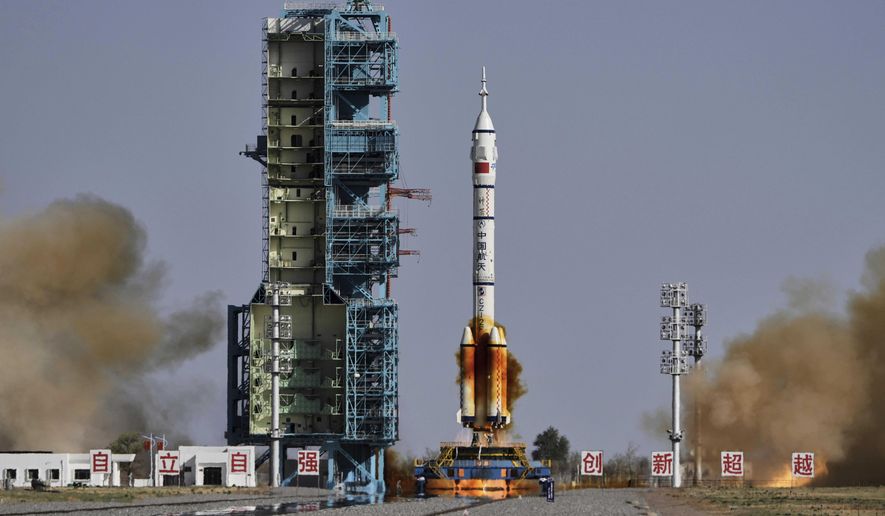As Russia held its Victory Day parade this year, hackers backing the Kremlin hijacked an orbiting satellite that provides television service to Ukraine.
Instead of normal programming, Ukrainian viewers saw parade footage beamed in from Moscow: waves of tanks, soldiers and weaponry. The message was meant to intimidate and was an illustration that 21st-century war is waged not just on land, sea and air but also in cyberspace and the reaches of outer space.
Disabling a satellite could deal a devastating blow without one bullet, and it can be done by targeting the satellite’s security software or disrupting its ability to send or receive signals from Earth.
“If you can impede a satellite’s ability to communicate, you can cause a significant disruption,” said Tom Pace, CEO of NetRise, a cybersecurity firm focused on protecting supply chains.
“Think about GPS,” said Mr. Pace, who served in the Marines before working on cyber issues at the Department of Energy. “Imagine if a population lost that and the confusion it would cause.”
More than 12,000 operating satellites now orbit the planet, playing a critical role not just in broadcast communications but also in military operations, navigation systems like GPS, intelligence gathering and economic supply chains. They are also key to early launch-detection efforts, which can warn of approaching missiles.
That makes them a significant national security vulnerability, and a prime target for anyone looking to undermine an adversary’s economy or military readiness — or deliver a psychological blow like the hackers supporting Russia did when they hijacked television signals to Ukraine.
National security officials say Russia is developing a nuclear, space-based weapon designed to take out virtually every satellite in low-Earth orbit at once. The weapon would combine a physical attack that would ripple outward, destroying more satellites, while the nuclear component is used to fry their electronics.
U.S. officials declassified information about the weapon after Rep. Mike Turner, R-Ohio, issued a public warning about the technology. Mr. Turner has pushed for the Department of Defense to provide a classified briefing to lawmakers on the weapon, which, if deployed, would violate an international treaty prohibiting weapons of mass destruction in space.
Mr. Turner said such a weapon could render low-Earth orbit unusable for satellites for as long as a year. If it were used, the effects would be devastating: potentially leaving the U.S. and its allies vulnerable to economic upheaval and even a nuclear attack.
Russia and China also would lose satellites, though they are believed to be less reliant on the same kinds of satellites as the U.S.
Valuable minerals and other materials found on the moon and in asteroids could lead to future conflicts as nations look to exploit new technologies and energy sources.
Acting NASA Administrator Sean Duffy announced plans this month to send a small nuclear reactor to the moon, saying it’s important the U.S. does so before China or Russia.
“We’re in a race to the moon, in a race with China to the moon,” Mr. Duffy said. “To have a base on the moon, we need energy and some of the key locations on the moon. … We want to get there first and claim that for America.”
China and Russia have announced plans for their own nuclear plants on the moon in the coming years, while the U.S. is planning missions to the moon and Mars. Artificial intelligence is likely to speed up the competition, as is the demand for the energy that AI requires.
Messages left with Russia’s Embassy in Washington were not returned.
Despite its steps into outer space, China opposes any extraterrestrial arms race, according to Liu Pengyu, a spokesperson for China’s Embassy in Washington. He said it is the U.S. that is threatening to militarize the final frontier.
“It has kept expanding military strength in space, created space military alliances, and attempted to turn space into a war zone,” Liu said. “China urges the U.S. to stop spreading irresponsible rhetoric, stop expanding military build-up in space, and make due contribution to upholding the lasting peace and security in space.”
American dominance in space has been largely unquestioned for decades following the end of the Cold War and the fall of the Soviet Union. But the new threats and competition posed by Russia and China show the need for an aggressive response, U.S. officials say.
The hope, Mr. Turner said, is that the U.S. can take steps to ensure Russia and China can’t get the upper hand, and the frightening potential of space weapons is not realized.
“You have to pay attention to these things so they don’t happen,” he said.




Please read our comment policy before commenting.